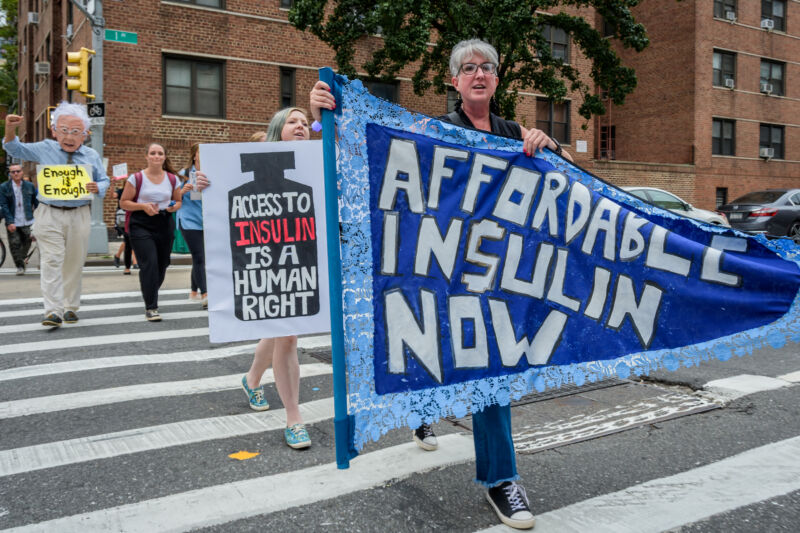
Pharmaceutical giant Eli Lilly, one of the country’s leading insulin makers, announced Wednesday that it will slash its high list prices for some of its insulins and will immediately offer programs to limit out-of-pocket costs to $35 per month for people with commercial insurance as well as those who are uninsured.
The price cap matches the one set by the federal government for Medicare, which went into effect this year via the Inflation Reduction Act.
While Lilly’s announcement comes just two months after enactment of the government’s $35 cap, it follows years of blistering outrage over the skyrocketing prices of insulin in the US, widely seen as price gouging.
A study of insulin list prices from 2018 found US prices were often set five- to 10-times higher than prices in other high-income countries. In 2018, the average price of a standardized unit of insulin in the US was $98.70, while the average was just $8.81 in other high-income countries. The cost of making insulin products—even the newer insulin products—generally falls between $2 and $6 a vial, according to a 2018 study in BMJ Global Health. Yet, Lilly’s most commonly prescribed insulin product, Humalog U-100, currently has a list price of $274.70 for a single 10 mL vial.
Outrage over insulin pricing hit a flashpoint amid the chaos of Twitter late last year when an account posing as Lilly’s tweeted: “We are excited to announce insulin is free now.” As the company struggled to get the viral, yet false, tweet removed, it put out an apology for the “misleading message.” This spurred Twitter users to criticize the company’s pricing, with one responding simply, “Apologize to diabetics for price gouging.”
“Deadly outrage”
According to today’s announcement, Lilly will slash Humalog U-100’s price tag by up to 70 percent in the last quarter of this year, which could bring down a 10 mL vial’s price from $274.70 to as low as around $82. Another product, called Humulin, will also get a 70 percent reduction by the end of the year. The delay is to allow time for the company to negotiate with insurance companies and pharmacy benefit managers. In the meantime, Lilly will drop the price of its unbranded generic version of Humalog, Insulin Lispro U-100, from $82.41 for a 10 mL vial to $25 a vial, effective May 1.
More than 37 million Americans live with a form of diabetes, and 8.4 million rely on insulin. Of those, 1.3 million—over 15 percent of people who use insulin—ration their insulin due to high costs, according to a study published last year in the Annals of Internal Medicine.
With many people on insulin requiring multiple vials per month, the costs can easily reach hundreds of dollars—hence the push for monthly caps, which are already in place for Medicare Part D beneficiaries. In Wednesday’s announcement, Lilly said that people with commercial insurance can now also have an automatic cap of $35 per month if they purchase their insulin at participating retail pharmacies. People without insurance can go to InsulinAffordability.com and download a Lilly Insulin Value Program savings card to get insulins for $35 per month.
“The aggressive price cuts we’re announcing today should make a real difference for Americans with diabetes,” David Ricks, Lilly’s chair and CEO, said in a statement today. He added that the company is “driving for change in repricing older insulins,” as it works to develop newer products, for which they’ll likely set high list prices.
Peter Maybarduk, director of the Access to Medicines program at Public Citizen, a public advocacy and watchdog organization that has fought alongside other groups for affordable insulin, called Lilly’s announcement “overdue” and “an acknowledgment that insulin prices are a deadly outrage.”
The announced plans “will provide some relief to many patients—though not all—and also begin to ease the burden of high insulin prices on health care costs, for which everyone pays through taxes and insurance premiums,” Maybarduk said.
But, he added, “There’s much more to do. Novo Nordisk and Sanofi should follow suit with price reductions immediately.”
https://arstechnica.com/?p=1921106

